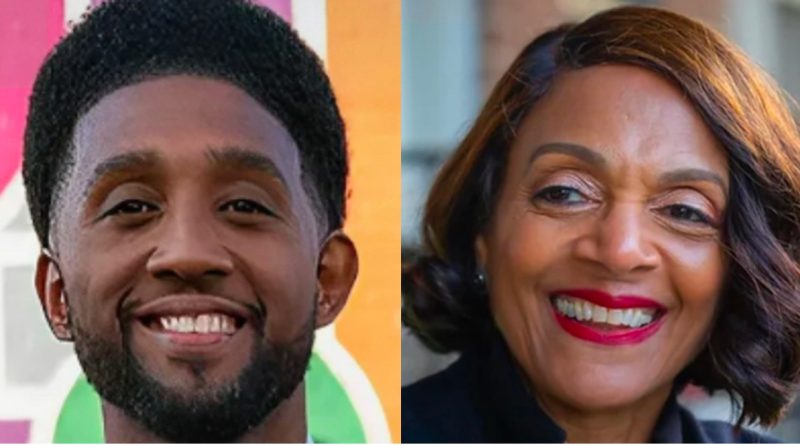Missing the Point – You don’t need all that much money to beat Brandon Scott
I’m going to handicap the Mayor’s race for you. It’s going to be one of the two candidates pictured above. You can thank me later. Baltimore needs and deserves so much more, but better candidates just aren’t willing to run.
There are currently eight Democrats who have filed to run in their primary to be Mayor of Baltimore. Eight candidates, not including Thiru Vignarajah who has announced, but hasn’t filed yet – and not including current Mayor Brandon Scott. (The candidate named Keith B. Scott is not Brandon Maurice Scott.) Not to worry. The deadline is Friday, February 9. Both Scott and Vignarajah still have time to file with the Maryland Board of Elections.
Of the total ten candidates who have filed, only one stands out. Former Mayor Sheila Dixon. I’m not a big fan. I’m certain that there are people out there far better qualified to be Mayor and save the city of Baltimore, but none of them wants to run. Ms. Dixon is, however, the only candidate of the ten who has a reasonable shot at winning and unseating incumbent Scott.
Scott is clueless and misguided by special interests. He may mean well, but hasn’t the slightest idea what it takes to stop the continuing decline of Baltimore and ignite its redevelopment for the benefit of all the city’s residents. Scott is a small-minded Mayor in a city with huge problems, the solutions to which are well beyond his vision, inclinations, and abilities. Is an ordinary Mayor what the people of Baltimore need? No. That time is long gone.
So, it’s Scott versus Dixon. Voting for any of the other eight candidates is a waste of your time and their money. If they really cared about their city and aren’t just running for personal and business reasons, they should end their effectively nonexistent campaigns for Mayor and stop trying to suck votes and airtime away from the only two candidates with a chance of winning.
Just to refresh your memory… In 2020, the city had, round numbers, 312,000 registered Democrats. Of those 312,000, only 148,000 voted for a whopping 24 candidates for Mayor. That’s a turnout rate of 47%. Brandon Scott finished first, of course, with only 44,000 votes or 30% of the total. Sheila Dixon came in second with 41,000 votes or 28%. Mary Miller finished in third place, well behind with 23,000 votes which was 16% of the total. Thiru Vignarajah came in fourth with fewer than 17,000 votes or 12% of the total cast. Who knows what the end result would have been had only the top two or three candidates been on the ballot? It’s numbers like these that argue for a primary with the potential for a runoff between the top two vote-getters.
A recent Baltimore Sun article made a big deal about Brandon Scott having raised so much more money than Sheila Dixon who has a PAC to help make up the difference. So what? Sure, some money, may even lots of it, is essential depending upon the size and nature of the prospective voter population. But what for? And is money the only determinant of victory?
Why do Baltimore mayoral primary candidates need money? It’s not for their websites. Nobody reads the small print on candidate websites which, at best, can use big print and pictures to solicit small-dollar donations.
Candidates think they need money for expensive mailings but, once again, no one reads the fine print – and that’s if and only if they aren’t thrown out on the voter’s way back from his or her mailbox.
Big money buys polling which can be extremely helpful. It’s an argument in favor of having the government do polling and sharing the results among all candidates, including those with less well-funded campaigns.
Money for television advertising is very helpful in a geographically large market, but will not have the hoped-for impact if the commercials are uninspiring or just plain poorly crafted. And major network stations tend to charge for expanded coverage, a great deal of which is outside the city limits. Better to run commercials on cable stations that can be more discriminating. That said, David Throne who is running statewide for US Senator is doing an excellent job getting his name out there early, leveling the playing field in his race against Angela Alsobrooks who is waiting, for whatever reasons, to run her TV commercials later.
The fact is, in a shrinking city with now only 298,000 registered Democratic voters as of December 2023, the most important thing for a candidate to do is go door to door, to community meetings and ministry services. Start early. Shake as many hands as possible. Appear on as many local television news and radio talk shows as possible. Favorable word of mouth is the best media and it’s free.
Any larger donations above the minimal money the candidate needs to get his or her name out there has nothing to do with the campaign itself. Those contributions – of $1000 or more up to the legal limit – are about buying access to the candidate and, if he or she wins, the elected official.
No, winning isn’t just about money. Think about the three Ms for a successful campaign… Money. Management. And, most importantly, Messaging.
When you’re a city that’s in big, persistent trouble – having, for example, already lost half its population over the past sixty years, with massive un- and even more insidious under-employment affecting two-thirds of its current population, and on and on – the ordinary variety of do-good programs just won’t cut it. You know what I’m talking about… The drivel of program details and soundbites that Mayor Scott and other candidates offer to show how caring they are. Throw in the word “plan” and they honestly believe they’re proposing something that will make a big and enduring difference. Enough of that already.
What’s missing in all this messaging is the all-inclusive “big idea” with the scale and power that will stop and reverse the city’s decline. The big idea that will bring more voters to the polls and elect a stranger to City Hall for all the smart and right reasons. The big idea that money can’t buy.
While you’re thinking about all this, go the Re-Elect Mayor Brandon Scott’s website, BrandonForBaltimore.com. First and foremost, it’s a pitch for small-dollar donations. That’s the first thing you see. …Click on the “Results” button, the one with nearly invisible white lettering on a yellow field. Start by scrolling down to the section entitled “Strengthening Neighborhoods + Fighting Blight.” Notice, in the text of the first item on the left, the mention of “creating jobs.” It’s almost an afterthought and they’re construction jobs which are not what city residents need. More to the point, it’s the only time the word “jobs” appears in Brandon’s “Results” section. For the record, Baltimore City is in desperate need of massive numbers of jobs for its unemployed and better, higher-paying jobs for the city’s under-employed. Almost without exception, every city program should be laser-focused on making those jobs happen as soon as possible. Bless his heart, Brandon just doesn’t get it.
Now scroll down to the next section titled, “Economic Growth + Record Low Unemployment.”
1. Brandon Scott believes that “economic growth” is all about remodeling the downtown of Baltimore for the benefit of certain developers and other special interests. He wouldn’t recognize real, all-inclusive economic growth if he tripped over it.
2. Changes in the unemployment rate in Baltimore, up or down, are incidental, meaning that they have little or nothing to do with the Office of the Mayor. He can take credit for a low unemployment rate all he wants, but the facts are that he had nothing to do with it.
3. And then there’s the matter of Brandon’s assertion that – under his leadership of course – Baltimore has “The eighth-fastest growing <county> economy in the United States, growing faster than the country as a whole.” …Wow! Eh, not really.
About the third item above, it’s an assertion based on US Department of Commerce, Bureau of Economic Analysis data for US counties having Gross Domestic Product (GDP) of $50 billion or more. Baltimore had a GDP growth rate of 5.9% in 2022. 2023 annual data isn’t available yet.
For the record, there were 85 counties in the US with 2022 GDP of $50 billion or more, only one of which has a GDP less than Baltimore. By comparison, the 2022 GDP of the entire US economy was $25.5 trillion. Given Baltimore’s size, an additional GDP of just $3 billion scores a 5.9% growth rate. It’s good news, but it’s an achievement that is much easier for Baltimore to accomplish than what larger county economies need to do to realize the same or higher rates of growth – let alone for the entire United States economy to do the same.
Mayor Scott’s brag is, in other words, more than just a tad less impressive than it might seem at first reading. Numerically, the smaller you are, the weaker your economy, the easier it is to grow it, particularly in the context of a strong, even hot state and national economy. His taking credit for this growth is ridiculous. If you’re a reporter or candidate debating Mayor Scott, ask him to explain, in detail, what he’s done to increase Baltimore’s GDP.
As usual, Mayor Scott is missing the point, taking credit where no credit is due. It’s a favorite tactic of weak and ineffectual leaders. The real news isn’t the 5.9% growth rate. The question on the table for voters is why does the city of Baltimore have a GDP of only $50 billion in the first place? Almost four years since he’s been Mayor and after years on the City Council before that. And what’s he going to do about it on behalf of the two-thirds of the city that struggles every day to get by?

Les Cohen is a long-term Marylander, having grown up in Annapolis. Professionally, he writes and edits materials for business and political clients from his base of operations in Columbia, Maryland. He has a Ph.D. in Urban and Regional Economics. Leave a comment or feel free to send him an email to [email protected].

